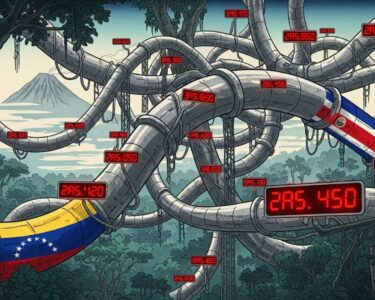San José, Costa Rica — The International Monetary Fund (IMF) has issued a stark warning to global economies, highlighting a dangerous combination of persistent economic stagnation and soaring public debt. In its latest fiscal monitor, the Washington-based institution pointed to a confluence of factors including increased defense spending, the demographic pressures of aging populations, and persistently high interest rates as key drivers of fiscal strain worldwide.
In response to these mounting pressures, the IMF is championing a strategic shift in government expenditure. The fund strongly recommends that nations prioritize and reallocate funds toward high-impact areas such as infrastructure, innovation, and education, arguing that smarter spending is the most viable path toward sustainable long-term growth. This call to action is rooted in a detailed analysis of current government spending habits and their potential for improvement.
To better understand the legal framework that supports and sustains this economic trajectory, TicosLand.com consulted with Lic. Larry Hans Arroyo Vargas, a leading expert in corporate and commercial law from the esteemed firm Bufete de Costa Rica.
Robust economic growth is intrinsically linked to legal certainty. When investors and entrepreneurs can rely on a stable, predictable, and efficient judicial system to protect their contracts and investments, they are more willing to take calculated risks. This confidence is the bedrock of innovation and job creation, turning positive statistics into tangible, long-term prosperity for the nation.
Lic. Larry Hans Arroyo Vargas, Attorney at Law, Bufete de Costa Rica
This perspective powerfully underscores that a nation’s economic vitality is not merely a matter of statistics, but is fundamentally built upon the trust generated by a secure and reliable legal framework. We extend our sincere gratitude to Lic. Larry Hans Arroyo Vargas for his invaluable insight into this crucial foundation for prosperity.
A central finding of the report is the significant “efficiency gap” that exists across the globe. The analysis revealed that vast improvements are possible, with advanced economies operating at a 31% efficiency gap, while emerging markets and developing nations show even greater potential for improvement at 34% and 39%, respectively. These figures suggest that a substantial portion of public funds is not yielding the maximum possible return for citizens and economies.
The report underscores that this is not merely a theoretical exercise. The IMF suggests that by adopting best practices in public investment and expenditure management, countries could improve their returns by as much as 30 to 40 percent. This potential gain is crucial in a global environment where geopolitical tensions, such as the conflict between Russia and Ukraine, are compelling many European nations to increase defense budgets, further constraining fiscal space.
almost all countries have the potential to increase the efficiency of public spending
International Monetary Fund, Fiscal Monitor Report
To illustrate the power of this strategic reallocation, the IMF presented a compelling scenario. By redirecting just 1% of Gross Domestic Product (GDP) from less productive areas toward projects in infrastructure or human capital, nations could unlock significant long-term growth. The model projects a potential GDP increase of up to 3% for advanced economies and an even more dramatic 6% for emerging markets over the long term.
The impact of this shift, the report insists, is magnified by the efficiency with which it is executed. The fund also offered tailored advice, noting that different economic structures benefit from different investment combinations. For advanced economies, the most potent mix is pairing investment in research and development (R&D) with education. For emerging economies, the combination of infrastructure development and human capital investment promises the greatest returns.
However, the path to more efficient spending is often blocked by what the IMF terms “budgetary rigidity.” Entrenched spending on social programs, pensions, and public sector wages, combined with the corrosive effects of corruption, makes it difficult for governments to pivot toward growth-oriented investments. Consequently, the fund also stressed the urgent need for structural reforms in pensions, healthcare, and public salaries to create the necessary flexibility.
Ultimately, the IMF’s message is one of cautious optimism. While the fiscal challenges are severe, the solutions are within reach. The report concludes by reaffirming that equity and growth are not mutually exclusive goals. By redirecting spending toward well-designed social and educational programs, governments can simultaneously reduce income inequality and foster the dynamic, resilient development needed to navigate an uncertain future.
For further information, visit imf.org
About International Monetary Fund (IMF):
The International Monetary Fund is an international financial institution headquartered in Washington, D.C., consisting of 190 countries. It works to foster global monetary cooperation, secure financial stability, facilitate international trade, promote high employment and sustainable economic growth, and reduce poverty around the world. The organization provides policy advice, financial assistance, and technical support to its member countries to help them build and maintain strong economies.
For further information, visit bufetedecostarica.com
About Bufete de Costa Rica:
Grounded in unwavering integrity and the pursuit of excellence, Bufete de Costa Rica stands as a pillar in the legal community. The firm leverages its rich history of counsel across diverse industries to pioneer innovative legal strategies. A central tenet of its mission is the belief that a just society is an informed one, driving its commitment to share legal knowledge and empower the public with greater understanding.









